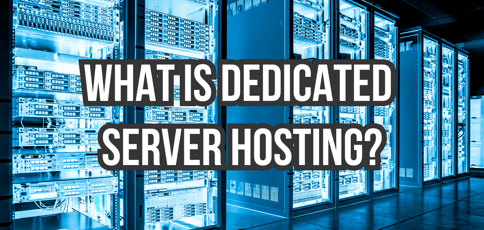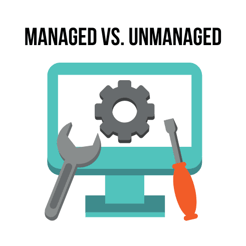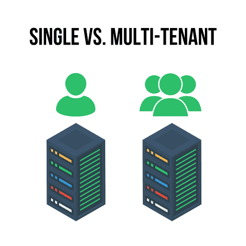
Dedicated server hosting is when an entire server is devoted solely to your website or application. This type of hosting gives you complete control over the server. You can choose your preferred operating system, hardware, and even software configurations.
It’s like having your own house with no roommates; you get all the space to yourself. You can decide how you want your security systems set up, the landscaping done, and the house’s overall look.
You need reliable performance and airtight security to run a large business or a high-traffic website. You won’t get that by sharing your server’s resources with other users. That’s where a dedicated server comes in, offering a mix of reliability, performance, and security, all wrapped in one powerful package.
-
Navigate This Article:
Understanding Dedicated Server Hosting
This type of hosting might seem pretty self-explanatory based on its name alone. But there’s more to it than just the name. Here’s what you need to understand about dedicated server hosting.
Dedicated Servers vs. Shared and VPS Hosting
To fully grasp the idea behind dedicated servers, let’s compare them with the other two popular types of web hosting: shared and VPS hosting.
In shared hosting, multiple users on a single server share the same resources. It’s similar to having roommates in an apartment — you share the space, from the bathroom to the living room, and split the cost of rent and utilities.
The problem with this type of hosting is that, as you’d expect, if one user consumes excessive resources, everyone else is affected. In real life, if one of your roommates uses all the hot water, others in the apartment won’t have enough. This principle also applies to shared hosting, where some users may consume more than their fair share of bandwidth.

VPS hosting is a bit different. It offers what we like to call a middle ground. It imitates a dedicated server environment with virtualization technology but lives on a shared physical server.
With VPS hosting, users have allocated resources but still share physical hardware with other VPS customers. This offers more control, although sometimes, it can affect performance.
Enter dedicated hosting, a standalone physical server that doesn’t share its resources with anyone except you, the owner. Since it dedicates all server resources to you, you’ll get better security, performance, and personalization.
Key Features and Benefits
When shopping for dedicated servers, you’ll notice the price tag is significantly higher than shared and VPS hosting plans — the cost is well-justified by its benefits. Let’s look at these benefits in detail.
Full Control and Customization
One of the standout features of dedicated server hosting is the level of control and customization it offers. To begin with, you’ll get something called root access to your server.
This means you can install any software and make any configurations you need on your hardware. It’s even better if you’re a business with unique software requirements or need to adjust your server environment frequently. You can make these changes anytime you want to because you have full control over your hosting environment.
Enhanced Performance and Reliability
Since you have exclusive access to all of your server’s resources, from CPU and RAM to bandwidth, you’ll experience better site performance and reliability. This type of setup is exactly what you need to handle large volumes of traffic and complex transactions without the risk of downtime.
That’s because you’re not sharing server resources with other users. They can’t overburden your server because they don’t have access to it in the first place.
Security Advantages
As we saw earlier, security is a major advantage of dedicated hosting. If you want peace of mind, not sharing the server with other users is a great place to start.
Keep in mind that you also have the freedom to implement security measures tailored to your specific needs. You can set up firewalls, security protocols, and more, depending on what your site or application needs to stay secure.
Types of Dedicated Servers
Not all dedicated servers are the same. You should know the difference to be able to choose one that’s compatible with your unique needs. The type of dedicated server you choose may depend on your budget and level of server management expertise.
Managed vs. Unmanaged Dedicated Servers
Managed dedicated servers outsource the server management aspect to the hosting provider. The web host is usually in charge of the technical setup, maintenance, security updates, and support tasks.

This type of dedicated server works best if you run a business without a dedicated IT team or if you’d rather just focus on the core operations of the business than on IT management.
Unmanaged dedicated servers do the opposite. If you choose this option, you’ll have complete control over the server. But it’s only recommended for a tech-savvy business that requires custom setups and wants full authority over the server environment.
The biggest downside, though, is that you must also handle all maintenance and troubleshooting independently if you decide to go in this direction.
Single vs. Multi-Tenant Dedicated Servers
Single-tenant dedicated servers serve only one client, providing the highest level of security and resource availability.

This setup is perfect for businesses with intensive compute needs or strict data security requirements.
Multi-tenant dedicated servers still maintain their core purpose of being used by a single client. The key difference here is that it also supports hosting multiple projects or customers under one server.
You may choose this option to run different projects that still need the benefits of dedicated resources without renting a new server.
Advantages of Dedicated Servers
Better performance, reliability, and security are the three key advantages of investing in a dedicated server. Here’s why.
Performance Benefits
Dedicated servers usually come with high-speed processing power and ample bandwidth. That explains why they can comfortably handle significant amounts of data and high traffic efficiently.
As a result, you’ll experience reduced latency, improved website load times, and a smoother user experience. The secret? Not sharing resources with other users. It’s as simple as that.
Reliability and Uptime
Since websites on the same server aren’t competing for resources like shared hosting environments, dedicated servers are usually more reliable and stable. You’ll also find that most web hosts offer redundant infrastructure and failover solutions for these servers.
That means if the server’s hardware takes a hit, operations can continue uninterrupted on backup equipment. This setup maximizes uptime and ensures consistent availability.
Security Enhancements
The enhanced level of security stems from the fact that you are isolated from other users. Whatever they decide to do with their servers and the consequences of their actions (security-wise) won’t impact your server.
You won’t have to worry about issues such as cross-site contaminations or DDoS attacks targeting another site. That’s because your server lives in its own dedicated environment.
Use Cases and Industries
Dedicated servers suit any industry, website, or application where performance, security, and reliability are paramount. Let’s explore some examples of such environments.
eCommerce Websites
For eCommerce websites, dedicated servers can handle high traffic volumes and numerous transactions without issues.

This is particularly important during sales or promotional events when traffic spikes. The holiday season is an example of a period when eCommerce traffic may increase. A dedicated server has the power and bandwidth to easily accommodate fluctuations in traffic.
But it’s not just about traffic. We’ve also talked about enhanced security measures. eCommerce websites need top-notch security to protect sensitive customer data such as credit card information and personal details. A dedicated server’s isolated environment offers enhanced security compared to shared servers.
Gaming Servers
Online gaming is only fun when there’s low latency and high performance. That’s what you get with a dedicated server, which allows for a fast and smooth multiplayer experience.

These servers can efficiently handle the synchronous communication needed for real-time gameplay and live streaming. They also offer the scalability required to support increasingly complex virtual environments without sacrificing performance.
With a dedicated gaming server, players can customize their security settings and game mods to their liking, which often aren’t options in a shared environment.
Enterprise Applications
Mission-critical applications and databases need the reliability and security of dedicated servers to achieve uninterrupted operations. And the best part of it all is that you can configure these servers to meet the mission’s objectives.

Whether you need high-availability setups, advanced backup solutions, greater computing power, or even to achieve certain compliance standards, a dedicated server is a sure bet.
This is especially important for healthcare, finance, and government industries, where the organization may be held to HIPAA or PCI-compliant standards. A dedicated server gives you full control and provides the infrastructure that’s necessary for meeting these strict regulations.
Considerations for Choosing a Dedicated Server
The best way to experience the benefits of dedicated server hosting is to choose a server that works for you. This decision evolves around technical specifications, budget constraints, and scalability potential. Let’s take a quick look.
Technical Requirements
To determine your server’s technical requirements, you need to examine how much resources your project consumes. The answer to this question will help you choose the right technical requirements for your server, including the CPU power, RAM, and storage necessary to handle your application.
When you know the type and intensity of the workload, it becomes easier to choose the processing power needed. The same applies to requirements, especially if the business handles large volumes of data transfer or requires high-speed internet connections for real-time communications.
Budget Considerations
Once your technical requirements are out of the way, the next thing you need to think about is your budget. Don’t choose the most expensive dedicated server because you assume it’s the best. Plenty of web hosts, such as InMotion Hosting and A2 Hosting, offer more affordable dedicated servers. Make sure you’re getting value for your money.
Remember, dedicated servers usually cost more than VPS and shared servers. But being expensive doesn’t necessarily mean having higher quality. Make sure you know what you’re paying for, and factor in additional costs such as management fees and operating systems if applicable.
Scalability and Future-Proofing
When selecting a dedicated server, remember to plan for future growth. One way to do this is to consider the scalability of resources like CPU, RAM, and storage. Can you upgrade them when you need to? If not, they’re likely not worth the investment.
The last thing you want is to conduct a complete system overhaul just because you need to scale your server vertically. Not only is it expensive, but also disruptive. The right server is one that grows with your business. You shouldn’t have to change hosts to achieve that.
How to Implement Dedicated Server Hosting
Now, let’s talk about the fun part: implementing dedicated server hosting. It’s not just about selecting a hosting plan, paying for it, and then experiencing the benefits of dedicated servers. Here’s what the process entails.
Selecting a Hosting Provider
Needless to say, you need the right hosting provider. For best results, I recommend reputable hosts like A2 Hosting, InMotion Hosting, Hostwinds, or Bluehost.
If you decide to go with any other host, make sure they:
- Offer the latest and most powerful hardware options that can handle your specific workload requirements.
- Have a reputation for excellent customer support just in case you need their help resolving issues.
- Fit your budget while offering the flexibility to scale resources as needed.
- Have top-level security protocols and compliance certifications to ensure your data is safe and meets industry standards.
Note that the above requirements are not final. As I mentioned before, you first need to know why you’re looking for a dedicated server. That way, you can fine-tune your requirements for the right host.
Evaluating Reliability, Support, and Service Level Agreements (SLAs)
Don’t underestimate the importance of evaluating the hosting provider’s reliability, the quality of customer support, and the specifics of its service level agreement (SLA). Reliable hosting infrastructure affects everything from your website’s uptime to your hosted applications’ performance. On the other hand, customer support should be easy to access and responsive. You shouldn’t have to wait hours to get the help you need.
Lastly, SLAs outline the service expectations and compensation if the provider fails to meet these standards. In fact, you should consider a lack of an SLA as a red flag. You don’t need a host that’s committed to collecting your money but can’t promise anything when it comes to service delivery.
You should know: One of the most important pieces of your SLA is the web host’s uptime guarantee. It should be 99.9% or higher.
Setting up and Configuring a Dedicated Server
You’re responsible for setting up your dedicated server to match your needs. How you go about this process may significantly impact whether you see the benefits of hosting your project in a dedicated environment.
The setup process includes:
- Customizing the server’s settings.
- Installing specific software.
- Establishing custom rules, if applicable.
Make sure you set up the server to support your goals and justify your choice of a dedicated space over other options.
If you don’t have server management experience, you can choose a managed dedicated server plan to have the pros do it for you. This service includes the setup, configuration, and ongoing maintenance.
Best Practices for Managing and Maintaining Dedicated Servers
As with most technologies, the setup process isn’t the end of the road. You’ll need to manage and maintain your server.
For instance, don’t forget to keep an eye on the performance and resource use. That’s one of the best ways to identify and fix potential issues before they cause significant problems.
You also need to perform daily backups to keep your data secure in case of a service disruption. Power outages and DDoS attacks can take down the network, and having backups ensures that you don’t lose important data when these incidents occur.
Security Vulnerabilities to Consider
Although dedicated servers have better security than shared servers, they don’t come that way out of the box. Achieving tight security is only possible through the right configurations and practices, which we’ll discuss next.
Hardening Server Security
Consider adding multiple layers of protection to safeguard your server from attacks. Your first step is to set up secure server access and authentication.
You can create strict login credentials, use multi-factor authentication, and restrict access to the server to only authorized users.
Additionally, keep everything up-to-date, from operating systems and applications to the network infrastructure, to avoid potential security gaps.
Data Protection and Compliance
Your server should comply with applicable regulatory standards when handling sensitive data, such as personal health or customer credit card information. Make sure you have security systems, such as SSL/TLS, set up to encrypt sensitive data and communications both in transit and at rest.
Some industries also have specific regulatory requirements. Examples include:
- GDPR (General Data Protection Regulation) for those handling European data.
- HIPAA (Health Insurance Portability and Accountability Act) for those involved with health information in the U.S.
- Payment Card Industry (PCI) compliance for those processing payments online.
These regulations often require specific security measures, ranging from the physical and digital protection of data and regular audits to the establishment of certain organizational policies. Make sure you understand and implement regulatory requirements that apply to your specific industry.
Myths About Dedicated Server Hosting
Dedicated server hosting is one of the most misunderstood types of hosting services. These misconceptions often arise from outdated information or overgeneralizations. Below, I’ve debunked some common myths about this type of hosting.
Myth 1: Dedicated Servers Are Only for Large Businesses
You don’t need to have a large enterprise with a massive budget to experience the benefits of dedicated server hosting. Yes, these servers have powerful features, and that’s one of the reasons they cost more than other hosting environments.
But did you know that there are more than 330,000 web hosting companies worldwide? From a consumer’s standpoint, that means competitive prices, which explains why any business, big or small, can access these servers for less than $100 per month.
Myth 2: Dedicated Hosting Is Complicated to Manage
Although you can, you don’t need advanced technical skills to manage your dedicated server. Remember when we discussed managed dedicated servers? If you opt for this service, the web host will handle much of the technical maintenance and administration.
As a result, you don’t need to manage the setup, security, backups, and maintenance of owning your own server. It also prevents large organizations from needing extensive IT departments for server administration tasks.
Myth 3: Dedicated Servers Aren’t Flexible
Some believe dedicated servers are only good at performance, security, customization, and availability. But when it comes to flexibility, that’s where they draw the line. That shouldn’t be the case, though.
On the contrary, many hosting providers offer customizable server options that you can upgrade and scale to meet changing demands.
Future Trends and Innovations to Expect
The technology industry is evolving exponentially. The same applies to the technologies behind dedicated server hosting. Upcoming trends and innovations will likely improve the functionality, efficiency, and flexibility of dedicated servers. Here are the top predictions.
Advancements in Hardware Technology
We should expect even better and more powerful innovations in hardware technology. Newer processors, for example, will offer increased processing power, allowing these servers to handle bigger loads.
We’re also witnessing massive campaigns on energy conservation throughout the world. This trend could make hardware technology more energy-efficient.
If there’s anything we’ve learned over the past few decades regarding storage technology, it’s that it evolves almost every year.
The first computer launched in 1956 by IBM had only five megabytes of storage space. Fast-forward to 2024, and we’re hearing names like yottabytes in conversations about supercomputers.
NVMe SSDs and newer forms of non-volatile memory devices will provide faster data access speeds and improved durability. Similarly, innovations in networking technologies like 5G and advanced ethernet capabilities will further reduce latency and increase connectivity options.
Lastly, we can’t ignore the rise of edge computing and distributed architectures. This technology will continue to push data processing even closer to the source of data generation. As a result, it will reduce response times and bandwidth usage, which is particularly beneficial for IoT and location-based services.
Automation and Orchestration
Now more than ever, automation and orchestration can revolutionize the management of dedicated servers. Artificial intelligence has also entered the fray, streamlining many routine tasks such as deployment, configuration, and maintenance.
Automation tools, coupled with the power of artificial intelligence, can significantly reduce the possibility of human error, increase operational efficiency, and free up IT staff to focus on more strategic tasks.
It’s also worth noting that there has been a massive interest in cloud adoption, especially among businesses, over the past few years.
For this reason, we are predicting a trend where businesses will manage both on-premises and cloud resources through a single dedicated server platform. This trend will improve the flexibility and scalability of IT infrastructures, simplify management, and allow organizations to optimize their hosting environments based on their needs.
Embracing the Promise and Possibilities of Dedicated Hosting
We’ve come to the end of our definitive guide to dedicated server hosting. I hope you’ve learned that you don’t need to have the same budget as Fortune 500 companies to experience the benefits of a dedicated server. You can be a small business owner and still reap the benefits of dedicated hosting.
If your project, be it a website, application, or video game, needs more server resources, advanced security, high uptime, and privacy, then a dedicated server is for you. It’s not a battle of the haves and have-nots. Rather, it’s about those who need it and those who don’t.







